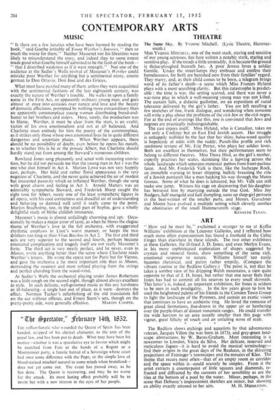THEATRE
The Same Sky. By Yvonne Mitchell. (Lyric Theatre, Hammer- smith.)
Miss YVONNE MITCHELL, one of the most stark, staring and sensitive of our young actresses, has here written a notably stark, staring and sensitive play. If she treads a little unsteadily, it is because the ground is thrice-ploughed beneath her. A poor Jewess loves a soldier Gentile. Under the street-lamps they embrace and confess their homelessness, for both are banished now from their families' regard. They marry, and, as their child comes to be born, a telegram brings word of its father's death—a scene which Miss Frances Hyland plays with a most searching clarity. But this catastrophe is predict- able : the time is war, the setting scarred, and there was never a war-time play in which a well-meaning young man was not killed. The curtain falls, a didactic guillotine, on an exposition of racial tolerance delivered by the girl's father. You are left recalling a few stretches of fine, frank dialogue, and wondering when someone will write a play about the problems of the rich Jew or the rich negro. For at the end of evenings like this, one is convinced that Jews and negroes are practically indistinguishable.
The cast enjoys itself. Miss Hyland, who is Canadian, takes on not only a Cockney but an East End Jewish accent. Her struggle is unhappily nullified by the fact that her shiny, balsa-wood quality is hopelessly at odds with the ruddy, Punch-like profile and rich sandstone texture of Mr. Eric Porter, who plays her soldier lover. Both are excellent in themselves, but their performances seem to belong to different theatres. Miss Thora Hird, as the girl's mother, expertly practises her scales, skimming like a lapwing across the whole landscape which separates maternal pathos from front-parlour farce. And Mr. Frederick Valk is there, like the Inchcape Rock, an immobile warning to lesser shipping, bulkily breasting the role of a Jewish patriarch like a man hacking his way through the Matto Grosso. Some of what he does is laboured, but Mr. Vilk can still make one jump. Witness his rage on discovering that his daughter has betrayed him by marrying outside the true God. Miss Joy Rodgers, half marigold and half dumpling, sums up shop-girl pertness in the best-written of the smaller parts, and Messrs. Gurschner and Moore have evolved a multiple setting which cleverly soothes the obstinacies of the small Hammersmith stage.
KENNETH TYNAN.


























 Previous page
Previous page